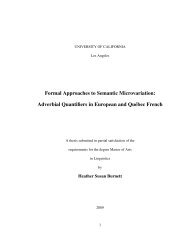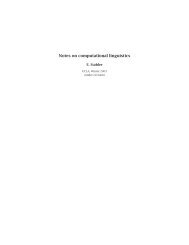miya-english-hausa dictionary - UCLA Department of Linguistics
miya-english-hausa dictionary - UCLA Department of Linguistics
miya-english-hausa dictionary - UCLA Department of Linguistics
You also want an ePaper? Increase the reach of your titles
YUMPU automatically turns print PDFs into web optimized ePapers that Google loves.
Miya-English-Hausa Dictionary 2<br />
íiy (L) v. A1 (v.n. íyak”) be able | iya<br />
íy Ö = Ö (H) rel.loc. 1. the place that …, where … ex íy gaf k íiy bwn where<br />
you go is where I go. 2. (with nominalized purpose phrase) in order to ex Mngila bat<br />
suw íiy nd”mk” Mangila went out to have a look around | inda .<br />
íyly (LHL?) n.? family | iyali<br />
íyka (H) det.loc. 1. there ex tk”m íiyk! go over there!. 2. (in íyk) there upon ex t˘,<br />
íyk Mazang myt say well, thereupon Mazanga died | can<br />
íyk”n (H) det.loc. here ex wshashanf” mn jiykn buwhiyf yk”na? how many<br />
year has it been since you came here? | nan<br />
íykwa = ykwa (T) interr.loc.adv. where? ex fy baf ykwa? where are you going?; f<br />
ts”gaku íykwa? where did you sit?; t˘, fy f b”kw íykw? well, you where have<br />
you come from? | ina?<br />
See ’a- at the beginning <strong>of</strong> the <strong>dictionary</strong> for words with initial a- not found here.<br />
A<br />
a- (T) prefix (lengthened when not post-pausal) 1. prefix vowel with no meaning, found<br />
on many root words and derivatives such as verbal nouns. 2. see ía- for words where<br />
the a is a root vowel. 3. prefix on ordinal numbers ex n(a) tsra the second one;<br />
tsruws” the seond <strong>of</strong> them (“his seond”). 4. prefix forming a locative adverbial form<br />
ex by nMngil water <strong>of</strong> Mangila hill (cf. by na Mngila ‘Mangila’s water’);<br />
tlwiy ntsk”n wild animal, animal <strong>of</strong> the bush (cf. tsk”n ‘the bush’) |<br />
(L) aspect perfective auxiliary with 3rd person subjects ex b”s” sy s/he washed |<br />
(LL) prep. 1. with (instrument) ex m cm giti he did work with an axe. 2. as,<br />
with respect to (marker <strong>of</strong> objective complement) ex dawun Kasy íam he sought<br />
Kasay as a wife | da (+ kayan aiki), don<br />
(LL) prep. marker <strong>of</strong> a postverbal subject ex t”nz” mr Ndwya (= Ndwya a<br />
t”nz” mr) Nduya planted millet; kw zratln Ksham k, buwatln d” b<br />
tsgatln when Kasham calls them they will come and sit down; tbrma ba kn(a)<br />
vrk” the mat that the boy bought |<br />
(L) aspect imperfective auxiliary ex fy zara w? who will you call?; mkuws” kd<br />
t tsyw he spent three days digging it (he “dayed” three he was digging) | na<br />
= w (L) interr. ( is by far the most frequent; see n for focussed subject equational<br />
questons) sentence final question marker <strong>of</strong> any type <strong>of</strong> question (yes/no, constituent)<br />
ex f tlak suw nd-a? Good morning! (standard greeting meaning, “Have you<br />
arisen?”); w zratln-? who called them? |<br />
(HL) prep. from (locative or temporal) ex m b‰k”m íykw? where have you come<br />
from?; tsuway hr bahy zhr from morning all the way until the late afternoon |<br />
daga<br />
= d (H irreg) aspect (see alsod) perfective auxiliary used when subject is focused ex<br />
w zrawa? who called?i; Ksham zraw t is Kasham who called (cf. Kshm zr<br />
sy ‘Kasham called’); my zraw it is we who called | ne/ce<br />
(H irreg) aspect conditional future auxiliary ex A: Dw, ìWy-y.î B: ì, n- by<br />
uwy.î A says, “Jump down.”, B (responds) “But I’ll get a fracture.” |

















